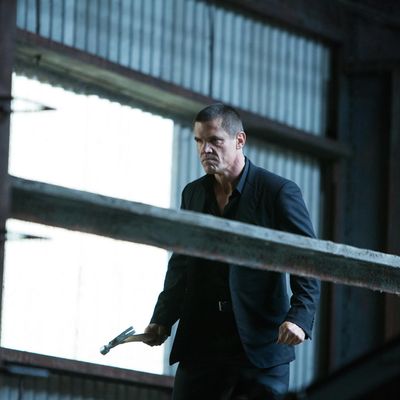
Watching Spike Lee’s decent but unmemorable remake of Park Chan-wook’s 2003 revenge picture Oldboy, I kept trying to figure out why he’d done it. Maybe after a line of box-office failures and difficulty getting financing for personal projects, he wanted to prove he could make a fast, violent action picture that didn’t have his trademark placards or harangues — that he could play the game. (He does call this a “Spike Lee Film” instead of the usual “Spike Lee Joint.”) Maybe he was attracted to the story as a way of spelling out the decadence and vileness of the white prep-school elite, a class to which the thuggish protagonist, here called Joe (Josh Brolin), belongs. Or maybe this is a big F.U. to Quentin Tarantino, with whom Lee has traded nasty barbs over Tarantino’s use of African-Americans in Jackie Brown and Django Unchained. In Oldboy, Lee stages hand-to-hand fights between Joe and hordes of bad guys in fluid, elegant single takes — an answer to Tarantino’s overblown production numbers in his revenge movie, Kill Bill. Plus, Tarantino headed the jury in Cannes that gave Oldboy the Grand Prix. So Lee could grab the rights to a favorite Tarantino flick, cast Tarantino favorite Samuel L. Jackson in a pivotal role, and savor his power.
Or maybe he just needed the money.
Oldboy centers on a mean, violent ad executive who’s inexplicably kidnapped and held prisoner in a small room for twenty years. (It was fifteen in the South Korean original.) Then he’s inexplicably released with a nice suit and a wad of cash and sets out to find his daughter and get revenge, not necessarily in that order. What’s even more inexplicable is that the man behind his ordeal appears to be steering him toward the truth — which turns out to be so garish and perverse that after the movie ends you might feel like getting a chemical peel.
The plot made no more sense in Korean, but the original Oldboy (loosely based on a Japanese manga) fit perfectly into Park’s cruel universe. In his Sympathy for Mr. Vengeance and Lady Vengeance, the obsession with an eye for an eye — or an eye, nose, and many teeth for an eye—inevitably leads to catastrophe. Revenge is never clean: There’s little correspondence between tit and tat. And though what happens is often unspeakably vile, Park views the bloodbaths with morbid detachment.
Spike Lee’s moral universe is more orderly (which can be taken as a compliment, if you wish) and his Oldboy feels like an exercise: brutal, effective, and without any obvious reason for being. Unlike the riveting Choi Min-sik (who eats a live octopus), Brolin is unusually unmagnetic — a thick-necked, vaguely simian brute. He’s moving when he first wakes up in his locked room (there’s a slot in the door for food) and thrashes and wails in incomprehension. On a TV screen, he watches the news that his ex-wife has been murdered and that physical evidence links him to the crime. Later, he reaches toward the image of his little daughter (put up for adoption, playing cello for her new parents) with a mixture of grief and fatherly pride.
It’s when Brolin’s Joe is released that he turns into a dull old boy. After finding himself free by the side of a road, he wastes no time in beating up some football players who hassle him. (He appears to kill one, although that’s not underscored.) The violence thereafter is gruesome — oodles of CG blood and brain matter — but out of scale. It’s shock for shock’s sake. It doesn’t track.
Joe’s only allies are a bar-owner classmate (Michael Imperioli) and a very young do-gooder named Marie (Elizabeth Olsen). I just saw Olsen in a miserable production of Romeo and Juliet at Off Broadway’s Classic Stage Company and thought (unlike most critics) she was terrific. She has classical chops, and her face with its wide planes and startlingly round eyes is endlessly readable. She’s not compelling here, though. She and Brolin have little chemistry and Lee can’t make their growing intimacy credible. The rest of the cast (including Jackson) is no more interesting, though South African Sharlto Copley has his moments as a mysteriously histrionic stranger. Whatever’s bugging him has got to be a doozy.
Perhaps my jaded response to Lee’s Oldboy comes from over-immersion in the sick, sick world of Park Chan-wook. By American multiplex standards, Oldboy is dark and savage, and those who don’t know the original will be stunned by the bleakness of the ending. Those who do (the Oldboy network) will be upset by how sentimental and tidy it is in comparison. Tarantino will probably hate it. Vengeance will remain elusive — till next time.


